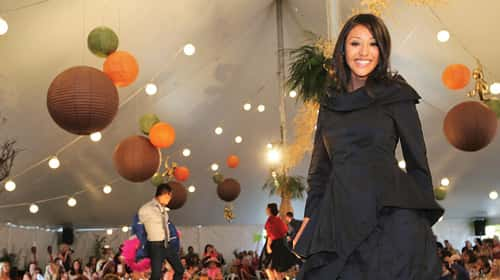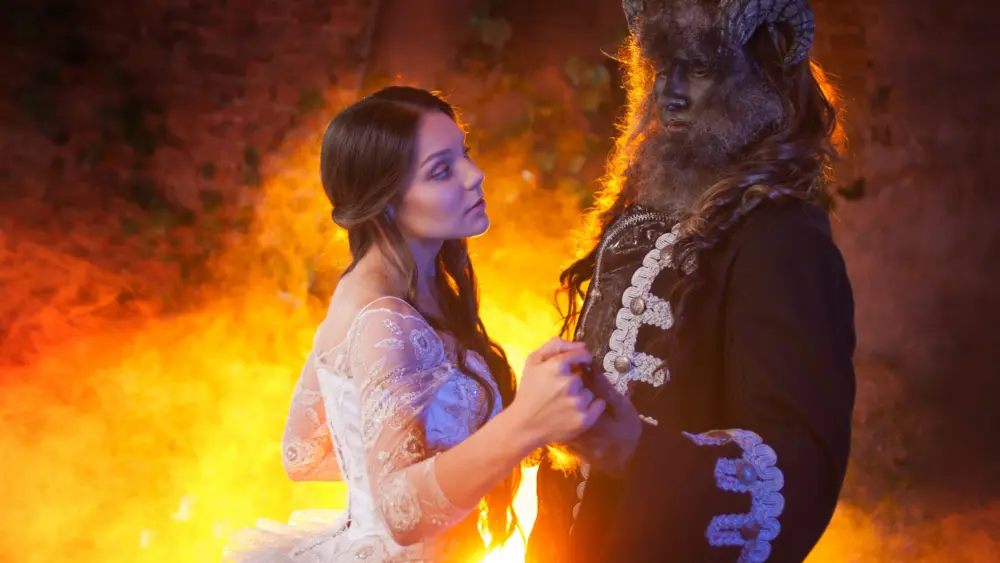We all know someone who’s battled or been lost to cancer. We’ve all felt the desire to do something—anything—to help fight this horrible disease? In the North Bay, sympathetic businesses are finding creative and natural ways to support nonprofits that are dedicated both to fighting cancer and aiding those who suffer from it. What follows is a sampling of the diverse approaches individuals, businesses and communities are taking to help tackle this dread disease. What they all have in common, expressed in individual ways, is a sense of personal, passionate mission and determination to see cancer defeated in their lifetime.
A personal motivation
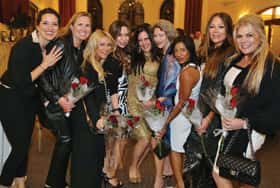 Biagi Bros., a 38-year-old family-owned transportation and logistics company with corporate offices in Napa, is known as a company that gives back to the community. Stacey Biagi, who grew up in the business and is now its director of social media and public relations, carries on that family tradition. She’s particularly passionate about helping to fight cancer, especially breast cancer. Biagi lost a dear friend to the disease and suspects, she wouldn’t have died if she’d had the knowledge now available to women about the importance of mammograms and early detection. “I have several girlfriends who’ve had it, but this one really hit me hard,” says Biagi. So she determined to fight the disease by fundraising for cancer research organizations and helping others know how important it is to take care of their bodies and get preventive care.
Biagi Bros., a 38-year-old family-owned transportation and logistics company with corporate offices in Napa, is known as a company that gives back to the community. Stacey Biagi, who grew up in the business and is now its director of social media and public relations, carries on that family tradition. She’s particularly passionate about helping to fight cancer, especially breast cancer. Biagi lost a dear friend to the disease and suspects, she wouldn’t have died if she’d had the knowledge now available to women about the importance of mammograms and early detection. “I have several girlfriends who’ve had it, but this one really hit me hard,” says Biagi. So she determined to fight the disease by fundraising for cancer research organizations and helping others know how important it is to take care of their bodies and get preventive care.
In 2016, to raise money for these causes, she hosted three different events. One at the Union Hotel in Santa Rosa, one at Mayacama Golf Club (which, she says, gave her a great discount) and one at Jackson Family Wine Center, for which the Jackson family donated everything. She convinced three chefs (Tom Schmidt from John Ash & Co., Danny Mai from Persimmon and Justin Wangler from Jackson Family Wines) to donate their time by saying, “This is going to make a difference, not only in my life, but in yours, the people you love and your community.” She found people eager to help, which, in itself, is impressive, she says. “This is a tough area [for fundraising], because people are constantly being asked to support different causes.” But the people she asked got onboard and made a difference.
Biagi Bros. looks on giving as not simply making handouts but creating a strategy so money—and the energy spent raising it—will be best applied. “Handouts and writing checks isn’t the answer,” says Biagi. While it might be fitting to give help without strings attached in certain specific cases, Biagi belives, in general, there should be some reciprocal effort, such as running in a race, picking up trash or competing in an event. She says she learned this approach from her father, who learned it from his father. “I’ve learned to keep what you have by giving it away,” she says. “I learned that at a very young age.”
Woman of the Year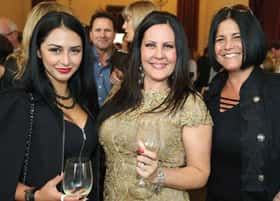
In 2016, Biagi was awarded Woman of the Year by the Leukemia and Lymphoma Society, a recognition earned by being the community leader who raised the most money to fight cancer. She attributes that success to her great team, which included campaign manager Laura Colgate (Eyesight) and team members, Sukie Gill (Sutter Hospital), Joni Rosinski (NorthBay biz magazine), Rachelle Robertson (Priority Lending Mortgage Corp.), Marie Winter (Loft Salon), Laura Allen (Allen Estate Wines), Cat Cvengros (Social Advocates for Youth) and Julane Gonnella (The Union Hotel). Together, the team impressively raised close to $145,000. “I had some heavy hitters on my team and that’s why we won,” she says.
“We’ve been tremendously lucky to have business support from influencers like Stacey Biagi supporting our mission to fight against blood cancers,” says Allison Stark, senior director of special events for the Leukemia and Lymphoma Society.
LLS supports research and patient access programs in the Bay Area. Its transportation assistance program, for example, is available for qualified, blood cancer patients with significant financial need; it helps with transportation expenses so they can travel to health care providers for cancer-related treatments. (A one-time grant of $500 per patient is available for qualified patients in the North Bay.) Among other grants given in the Bay Area, LLS invested more than $6.7 million into the University of California at San Francisco (UCSF) for funded research and $4.1 million into Stanford Medical Center research. Stark says LLS will partner with any other businesses or organizations that want to join in the fight against cancer, and LLS will find a way that works for them.
LLS’s strategy begins with information. “We want people to know we’re in the North Bay to support them through their fight against cancer. I think a lot of the people who interact with us come to us organically, whether they’ve received help from us though patient information or we’ve funded research they’re interested in.”
Blood cancers are particularly hard to fight, because they elude early detection, favor no particular demographic and exhibit no particular cause. “This kind of cancer knows no boundaries,” says Stark, “so we really have to focus on research and finding a cure, as well as helping those in the community who need assistance accessing care or treatment.”
LLS relies not on advertising but community outreach for fundraising. “We enable people in the community to fundraise in whatever form works for best them,” says Stark. Its three principal programs include Light the Night, an annual fundraising event in which community members come together, receive lanterns (red for supporters, yellow for in-memory and white for survivors) and walk their neighborhood in a spirit of support; participants create online accounts and raise money in ways of their own choosing, which is then donated to LLS. Man of the Year, Woman of the Year, and now Student of the Year are important community fundraising competitions, in which the team that raises the highest dollar figure gets the honor (Stacey Biagi and her team set a great example in that competition in 2016). The Team and Training Program lets athletes and people who love sports engage, form teams, train and compete while raising money for cancer research.
Stark says that everyone who participates in these events is enthusiastic about why they’re in the game: “When you ask anyone on the walk or at the race competitions what they’re doing, they’ll say, ‘We’re raising money to fight blood cancer!’”
Each team sets its own goal, and none is too small. “Every little bit helps,” says Stark, who adds that, for her (as with Stacey Biagi), the mission is personal. “I joined this fight because I’ve lost family to cancer and this is something I can do to honor their memory,” she says. “I’m really excited to be getting up and going to work each morning, because there’s real, tangible progress towards finding a cure.”
Making lemonade
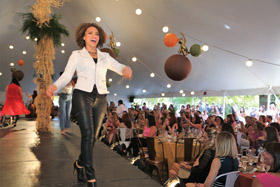 “People sometimes turn their grief about a personal loss into an action that’s really amazing for the community,” says Penny Cleary, director of development at Sutter Health North Bay. “There are so many opportunities to partner with nonprofit organizations that do great work, so whatever a person’s passion is, there’s an opportunity to give back and to partner with nonprofits working to address a need they care about.”
“People sometimes turn their grief about a personal loss into an action that’s really amazing for the community,” says Penny Cleary, director of development at Sutter Health North Bay. “There are so many opportunities to partner with nonprofit organizations that do great work, so whatever a person’s passion is, there’s an opportunity to give back and to partner with nonprofits working to address a need they care about.”
Breast cancer draws particular passion, she says, and three examples of support are particularly important to Sutter and the community. Santa Rosa-based Russian River Brewing Company has partnered with Sutter for the last eight of 10 years. “The owners, Natalie and Vincent Cilurzo, lost a dear friend to breast cancer and started doing a little fundraising in the pub to give to cancer research,” says Cleary, “ and I made a connection with her.”
Since then, the brewery has held a month-long, highly successful fundraising effort every October. “I think the first check we got from them was for $9,000,” says Cleary. “Last year, the check was for $140,000.” This, she says, is phenomenal for a small business. “They helped us connect with a constituency of supporters that might have been out of reach for us,” she says. “We wouldn’t be able to leverage the support without them.”
Sutter runs its own fundraiser, Catwalk for a Cure, a fashion show and luncheon that benefits Sutter’s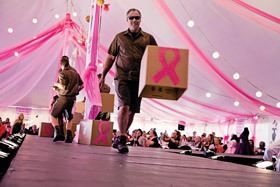 cancer screening and support services. “Sutter does some research, but the money raised goes mostly for the services we provide for cancer patients, including support groups, peer support programs, professional counseling programs, healing retreats and an education series, all of which are under the cancer support group umbrella” she says. “Sutter also has an Institute for Health and Healing, a program that serves people with any illness, but that includes a whole component of services just for cancer. It also has a screening and diagnosis program for those without insurance. “Catwalk supports all of them,” says Cleary.
cancer screening and support services. “Sutter does some research, but the money raised goes mostly for the services we provide for cancer patients, including support groups, peer support programs, professional counseling programs, healing retreats and an education series, all of which are under the cancer support group umbrella” she says. “Sutter also has an Institute for Health and Healing, a program that serves people with any illness, but that includes a whole component of services just for cancer. It also has a screening and diagnosis program for those without insurance. “Catwalk supports all of them,” says Cleary.
The pay off for businesses comes in the private feeling of satisfaction, but also, once per year, they get to meet some of the people their donations have helped. “We have a business luncheon where we bring together women and men who have benefited from community donations,” says Cleary, “and businesses get to see and hear how much their help has meant.”
Bringing communities together
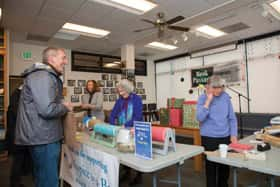 Every holiday season, Town Center Corte Madera sponsors Hospice by the Bay by providing free gift wrapping for the community utilizing hospice volunteers. Town Center provides a generous donation to Hospice by the Bay for providing these services and the nonprofit also receives on-the-spot donations from patrons. General information about hospice is available at both locations. It’s not fundraising for cancer, per se, but it is another example of how local communities benefit when business and giving go together.
Every holiday season, Town Center Corte Madera sponsors Hospice by the Bay by providing free gift wrapping for the community utilizing hospice volunteers. Town Center provides a generous donation to Hospice by the Bay for providing these services and the nonprofit also receives on-the-spot donations from patrons. General information about hospice is available at both locations. It’s not fundraising for cancer, per se, but it is another example of how local communities benefit when business and giving go together.
“We also have an ongoing relationship throughout the year with Book Passage, where we sell gently used books that are donated to Hospice by the Bay,” says Janet Evans, director of development and communications for Hospice by the Bay. “We split those proceeds with Book Passage. We also have volunteers gift wrapping purchased books at the Corte Madera Book Passage during the holidays.” Both relationships have existed for 25 years which demonstrates the commitment of support from both of these community businesses.
Rose Barlow, executive director of Zero Breast Cancer, notes that, while much progress has been made in the detection and treatment of breast cancer, the disease still has a significant impact, particularly on underserved members of the community, who often lack access to good information, health insurance or medical services. “Zero Breast Cancer focuses on sharing evidence-based information about breast cancer risk reduction,” she says. “Research confirms that physical exercise is important in this regard, which is why our annual Dipsea Hike for Zero Breast Cancer is such an important community event—and has been for 14 years.”
Barlow names a host of local companies that lend their support, including Cavallo Point, Bradley Real Estate, Bank of Marin, Equator Coffee, Clover Petaluma and United Markets, the Marin Independent Journal and Marin Scope (among many others). “A key reason this event is so successful is because of our many business partners who help in a variety of ways, including as underwriters and sponsors, providing volunteer teams, stepping up as in-kind donors providing essential goods and services and being our PR partners to help promote the event with discounted, nonprofit rates, for media advertising. Of course, social media is always available, and free for those interested in learning more about cancer and how to prevent it. “We’d like people to visit our website [www.zerobreastcancer.org] and follow us on Facebook and Twitter,” says Barlow. “We do what we can do to move the dial toward zero. People need to keep in touch so they can stay informed.”
Nobody can do it alone
On our own, other than try to stay healthy, keep fit, eat right and observe the basic lessons of illness prevention, we can’t really make an impact on a phenomenon as pervasive as cancer. Nor, for the most part, can a single business. But working together—partnering, in a team, as a business, with a nonprofit—a community can make a huge difference. One benefit you can feel, when you talk to people who throw themselves into fundraising for a cause they passionately believe in is the satisfaction of having put their passion, their grief or their anger to work to help those organizations on the front lines fighting this terrible disease. As 2016 LLS Woman of the Year Stacey Biagi says, “If we’re not taking care of each other, who’s going to do it?”
Send Me an Angel
Based in Chicago, Cellar Angels is a digital, direct-to-consumer marketing platform that provides private access to small, higher-end wineries (including come in Napa and Sonoma counties) that often lack national distribution. After purchase, Cellar Angels donates 10 percent of its proceeds to a charity of the customer’s choice; eligible organizations include those supporting environmental causes, health care, military personal and animal welfare, among others. “When people find out what we do, they say, ‘This is pure genius!’” says founder, president and CEO Martin Cody.
He explains that Cellar Angels provides people access to unique and high-quality wines at a reduced price and with a charity component built in. Participating wineries, which might normally have a hard time finding distribution, get exposure to customers nationwide. In turn, customers all over the country can enjoy private wine-tastings, via Skype and special incentive offers, with winemakers whose wines they’ve purchased. “These winery owners can’t travel the country all the time,” says Cody, “so if the winemaker wants to do a Skype tasting, we set it up.”
The customer will gather some friends or clients around a table, open the wine they’ve purchased and the winemaker (via Skype) will engage with the group about the wine. “That engagement,” says Cody, “is second only to being physically with the winemaker.” This personal touch, when added to the site’s giving aspect, has proven a popular combination among its growing membership of wine enthusiasts.
After a customer makes a purchase, they select a favorite charity (from a list on the website), check a box, and 10 percent of the Cellar Angels’ proceeds is donated. Among the choices are the Bonnie J. Addario Lung Cancer Foundation, Pediatric Cancer Research Foundation, Edith Sanford Breast Foundation and Gilda’s Club Chicago (an affiliate of the Cancer Support Community) among many others. “Since the wineries get solicited by philanthropic causes on an almost daily basis,” says Cody, “this gives them a chance to honor some of those requests while getting their name out to new fine wine consumers at the same time.”
Cellar Angels presents a creative, convenient and rewarding way for businesses and customers to give back to their community, fight cancer (or whatever their particular cause might be) while indulging their passion for wine. For wineries, it’s a simple way to give back to their community as a part of a strong marketing strategy. As Cody puts it, “We’re just trying to do good by doing good—plus, we also like higher end wines. Cellar Angels delivers Napa and Sonoma in the form of small, legendary producers from California’s famed wine region.”
www.cellarangels.com
Crushing Cancer
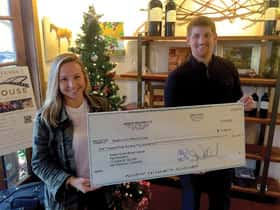 Yountville-based Jessup Cellars turned an eye to cancer research last October, dedicating $5 from every sold bottle of its flagship Table for Four wine to the Sisters Crush Breast Cancer Fundraiser. The Jordan family, which founded the fundraiser, owns Sisters Boutique, a Yountville couture consignment business. With $1,550 raised by Jessup Cellars, the fundraiser totaled nearly $60,000 to benefit the Breast Cancer Emergency Fund and Pink Heels Napa Valley.
Yountville-based Jessup Cellars turned an eye to cancer research last October, dedicating $5 from every sold bottle of its flagship Table for Four wine to the Sisters Crush Breast Cancer Fundraiser. The Jordan family, which founded the fundraiser, owns Sisters Boutique, a Yountville couture consignment business. With $1,550 raised by Jessup Cellars, the fundraiser totaled nearly $60,000 to benefit the Breast Cancer Emergency Fund and Pink Heels Napa Valley.
“Donating $5 per bottle was such an easy and way for us to support Sisters Crush Breast Cancer,” said AJ Eisiminger, tasting gallery manager at Jessup Cellars. “Along with our members and visitors, the citizens of Yountville helped drive the program. Our goal is to inspire other vintners to join the cause in 2017.”
jessupcellars.com; www.sistersnapavalley.com


